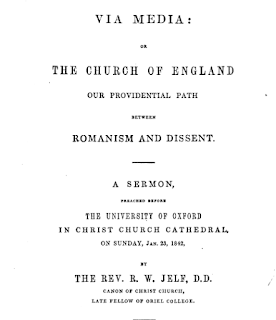"Our venerable Reformers": Jelf, the Old High tradition, and the Tract XC controversy
Yet, after all, it is painful thus to dwell upon the failings of a sister Church, which, amidst all her corruptions, has retained many Christian truths and holy practices in common with ourselves. Would God, that she would "remember from whence she is fallen, and repent, and do the first works". What might not Christendom have become, if, instead of setting herself obstinately against the purification of the temple, she had cooperated with ourselves in the blessed work of amendment! And even now, "if God peradventure should give her repentance to the acknowledgment of the truth", if she would repeal the Decrees of Trent, if she would purify her service-books, and rigidly deny to the creature the smallest portion of the worship due only to the Creator; if her Bishop, contenting himself with that "upper room" in the College of Bishops, which in honour of the Imperial City was conceded to him during many ages, and would lay aside the utterly groundless claim to universal supremacy, and that fearful name of "Universal Bishop", which, at the end of the sixth century, his own predecessor Gregory I himself denounced as "nomen istud blasphemiæ"; if these and similar reformations were conceded, she might become once more, what Christian Rome of the first ages was, a pure branch of the Holy Catholic Apostolic Church, and we might communicate with her in faith and good works, and in the extension of Christ's Kingdom, for she would have become identical with ourselves, having passed through the very process, by which we were called back by God's mercy to the place from whence we were fallen.
A footnote in Jelf's sermon indicates the fundamental difference between Newman's longing gazes across the Tiber and the Old High critique of Rome:
See Bishop Jewel's 'Replie to Harding', in defence of the Challenge at Paul's Cross; a work, in its main positions, unassailed and impregnable.
Newman had abandoned the English Reformation. Nockles notes that as early as 1837, "Newman was privately denouncing Cranmer and Jewel". By contrast, Jelf expounded the Old High reverence for the English Reformation. As Nockles puts it:
Old High Churchmen had never felt any dichotomy between their respect for antiquity and veneration of the Reformers. The appeal of the pre-Tractarian High Church campaigners was to revive 'the principles of the Reformation'.
We see this not least in the counsel given by Jelf to young admirers of Newman:
It is a mark of unsoundness in teaching, when young theologians, after a hurried perusal of some one or two of the Fathers, shall presume to sit in judgment on our venerable Reformers, who had many of them spent long lives in gathering the combined testimonies of those early writers, and digesting out of them a complete system of primitive theology.
Here, in other words, was a robust, vibrant alternative to Newman and Tract XC, rejoicing in the heritage of the reformed ecclesia Anglicana, not only free of any wistful looks across the Tiber, but - following the Old High tradition - entirely at one with the English Reformation's rejection of the papal supremacy and Tridentine doctrine.




Comments
Post a Comment